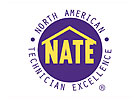
A survey from the Service Roundtable concluded that techs certified by the North American Technician Excellence exams have fewer callbacks, lower warranty expenses and higher billing efficiency rates than techs without NATE certification. Added up, the survey said NATE-certified techs account for more than $10,000 in additional annual profits.
NATE Inc. is an independent third-party certification body that helps assure consumers that a knowledgeable tech will service their home heating or cooling system. Only contractors employing NATE-certified techs, for example, can be listed on NATE’s “Consumer-Contractor Connection” Web page, and can request a free contractor marketing kit with logos, ad slicks, etc. Techs who pass NATE exams can have a NATE patch for their uniform and place NATE decals on their trucks.
NATE will begin advertising on public television stations and airport and hospital channels between March and April. The organization expects its ads to reach 85 million homeowners.
NATE has already certified tens of thousands of HVACR techs in the United States and Canada. Last year, NATE and the Gas Appliance Manufacturers Association developed two more NATE tests for hydronic heating.
Hydronic service tests for either oil or gas have been available since last summer. NATE is currently beta-testing the hydronic installation exams and expects to have them ready in the first quarter of this year.
To become certified, a tech must pass both a 50-question core exam followed by one of the 100-question specialty exams, such as the new hydronics service exams. A passing score is 70 percent; in other words, 35 of 50 questions on the core test and 70 of 100 on the specialty test. Certification lasts for five years, after which a technician must be recertified. Certified techs can add other certifications by passing additional specialty exams. Re-taking the core exam is not necessary.
To help prepare for an exam, NATE’s Web site includes what it refers to as the “knowledge areas of technician expertise” or KATEs - outlines for study that represent the skills a tech should possess to perform a specific job. Log on to www.natex.org and click on “Information, Forms & Data,” listed in the white bar near the top of the home page. Once you access the IFD page, click on KATES listed on the left-hand side of the page.
According to the NATE Web site, techs with at least two years’ experience that have completed some instruction from an educational institution, trade association or other training source do best on the exams. Trade groups, such as the PHCC-NA, have worked with NATE to develop preparation courses. The NATE Web site suggests that the pass rate is higher for techs who take a prep class vs. those who have not.